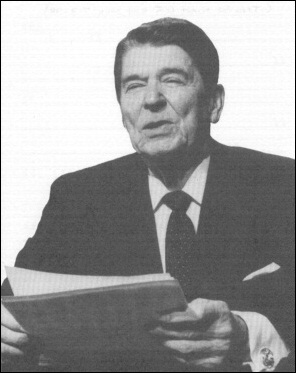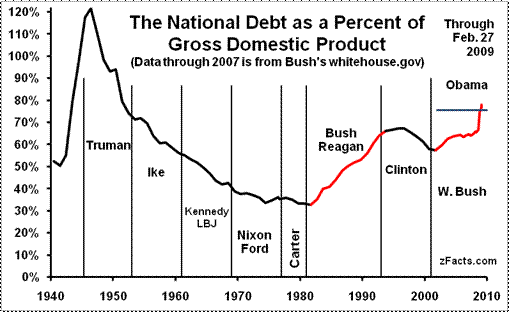Lessons in Reaganomics

"He knows less
about the budget than any president in my
lifetime. He can't even carry on a
conversation about the budget. It's an
absolute and utter disgrace."
--House Speaker Tip O'Neill, after a meeting
with Reagan, November 23, 1981
"For the
last 30 years he's been in a dream
world.... I think he actually believes that
giving more to rich people will make them work
harder, whereas the only way to make poor people
work is to tax their unemployment benefits."
--NAACP executive director Benjamin Hooks
commenting on Reagan's economic policies, January
25, 1983
"Reagan,
who more than any president in history railed
against government benefits and spending, set the
standard for all members of his administration. In
addition to his presidential pension of $99,500 a
year for life and his annual pension as a former
governor of California of $30,800...he received
Secret Service protection from forty full-time
agents and other security at a cost to the
government estimated at $10 million annually,
more than double that of other living presidents.
A suite of offices atop a new thirty-four-story
office building twenty minutes from his home,
commanding a view that extended from the Pacific
Ocean to the towers of downtown Los Angeles, cost
the government $173,000 a year to lease."
--Haynes Johnson, Sleepwalking Through
History: America in the Reagan Years
"At his
seventh press conference, President
Reagan...responds to a question about the 17%
black unemployment rate by pointing out that 'in
this time of great unemployment,' Sunday's paper
had '24 full pages of...employers looking for
employees,' though most of the jobs
available--computer operator, for example, or
cellular immunologist--require special training,
for which his administration has cut funds by
over 30%."
--Paul Slansky, The Clothes have no
Emperor
"What we
have found in this country, and maybe we're more
aware of it now, is one problem that we've had,
even in the best of times, and that is the people
who are sleeping on the grates, the homeless who
are homeless, you might say, by choice."
--President Reagan, defending himself against
charges of callousness on Good Morning America,
January 31, 1984
"The
Agriculture Department [under Reagan proposes]
cutting the size of school lunches.... In
addition, condiments such as ketchup and pickle
relish would be reclassified as vegetables."
--Paul Slansky, The Clothes have no
Emperor
"Bob
Cratchit was paid 10 shillings a week, which was
a very good wage at the time.... Bob, in
fact, had good cause to be happy with his
situation. He lived in a house, not a
tenement. His wife didn't have to
work.... He was able to afford the
traditional Christmas dinner of roast goose and
plum pudding.... So let's be fair to
Scrooge. He had his faults, but he wasn't
unfair to anyone."
--Ed Meese (Reagan's attorney general)
telling the National Press Club that Dickens'
Ebenezer Scrooge suffered from "bad press in
his time," December 15, 1983
"The
epitaph of the Reagan presidency will be:
'When Ronald Reagan became President, the United
States was the largest creditor
nation. When he left the presidency, we
were the world's largest debtor
nation.'"
--Lester Thurow, MIT professor of economics
"[A] lapse
into fiscal indiscipline on a scale never before
experienced in peacetime."
--David Stockman (Reagan's budget director)
describing the 1980's, The Triumph of
Politics: Why the Reagan Revolution Failed
"In the
Reagan years, more federal debt was added than in
the entire prior history of the United
States."
--Richard Darman (Reagan adviser), Who's
in Control? Polar Politics and the Sensible
Center
"Reagan's
theory was really 'trickle down' economics
borrowed from the Republican 1920s
(Harding-Coolidge-Hoover) and renamed 'supply
side.' Cut tax rates for the wealthy;
everyone else will benefit. As Reagan's
budget director David Stockman confided to me at
the time, the supply-side rhetoric 'was always a
Trojan horse to bring down the top rate.'
Many middle-class and poor citizens figured it
out, even if reporters did not."
--William Greider, "The Gipper's Economy", The Nation, June 28, 2004
The Reagan
Legacy -- Debt and Deficits
Two years into
Reagan's presidency, the United States
experienced its worst recession since the Great
Depression, with unemployment peaking at 10.8
percent. Rather than take responsibility,
Reagan attempted to blame the 1982 recession on
his predecessor, Jimmy Carter. (for details
click here)
Likewise, Reagan
would blame the explosion in red ink (debt and
deficits) that occurred during his years in
office on the U.S. Congress. Regarding
federal deficits, Reagan's shirking of
responsibility was especially egregious.
This can be seen from Reagan's statements during
his 1980 campaign and the early days of his
presidency:
"Mr.
Carter is acting as if he hasn't been in charge
for the past three and a half years; as if
someone else was responsible for the largest
deficit in American history."
--Ronald Reagan, nationally televised
campaign speech, October 24, 1980. (Federal
deficits totaled $252 billion under Mr. Carter. By the end of Mr. Reagan's presidency, federal deficits would
total over 1.4
trillion.)
"For
decades we have piled deficit upon deficit,
mortgaging our future and our children's future
for the temporary convenience of the
present. To continue this long trend is to
guarantee tremendous social, cultural, political,
and economic upheavals. You and I, as
individuals, can, by borrowing, live beyond our
means, but only for a limited period of
time. Why, then, should we think that
collectively, as a nation, we're not bound by
that same limitation? We must act today in
order to preserve tomorrow. And let there
be no misunderstanding: We are going to
begin to act, beginning today."
--President Reagan, in his inaugural address,
January 20, 1981
"A
trillion dollars would be a stack of $1,000 bills
67 miles high."
--President Reagan warning in February 1981
that the national debt, accumulated over the
United States' 200 year history, is approaching
$1 trillion. (Under Reagan, the national
debt would nearly
triple to $2.9
trillion.)
Debt
as a percentage
Year
Deficit
Debt
of that year's GDP
1979
-$40,183
-$828,923
34%
1980
-73,835
-908,503
34
1981
-78,976
-994,298
34
1982
-127,989
-1,136,798
36
1983
-207,818
-1,371,164
41
1984
-185,388
-1,564,110
42
1985
-212,334
-1,816,974
46
1986
-221,245
-2,120,082
50
1987
-149,769
-2,345,578
53
1988
-155,187
-2,600,760
54
1989
-152,481
-2,867,538
55
U.S.
Office of Management and Budget, Historical
Tables, annual.
|
"[A]
drastic reduction in the deficit...will take
place in the fiscal year '82."
--President Reagan, news conference, cited
in The New York Times, March 6,
1981. (In fiscal 1982, the first full year
of Reagan's presidency, the government ran up a
record budget deficit of $128 billion.)
Early in his
presidency, Reagan chose as his economic advisers
a group that espoused a radical economic theory
called "supply-side." The
supply-siders told Reagan that if he gave tax
cuts to the top brackets (the wealthiest
individuals) the positive effects would
"trickle down" to everyone else.
Tax cuts, they argued, would produce so much
extra growth in the economy -- and therefore extra tax revenue -- that America could simply
outgrow its deficits. The proposition was that tax cuts would pay for themselves. Reagan bought into
supply-side theory, which is why in 1981 he
predicted that there would be a "drastic
reduction in the deficit."
However, Reagan
soon discovered that his supply-side advisers
were wrong. Tax cuts, instead of reducing
the deficit, caused the deficit to balloon. After 1981, Reagan made no
more rosy predictions regarding the deficit.
At this
point, Reagan would change strategy. He
would blame the U.S. Congress for the record
deficits that accrued during his years in
office. Reagan would say that Congress was
responsible, because Congress did not slash spending enough--meaning social spending, since
Reagan always championed increased military
spending.
Reagan chose
to ignore the fact that his own Republican Party
was in control of the Senate from January 1981 to
January 1987, and that Congress actually spent
less than what he originally had asked for.
(for details
click here)
Federal deficits would continue unabated until the
presidency of Bill Clinton when fiscal
responsibility would finally be restored.
President Clinton would achieve a balanced budget
(and even record surpluses) in large measure by
restoring higher taxes on the wealthy.
Shoulders of Giants Investor
Addendum -- The Post Clinton Years:
"America has a strong economy and a surplus.... Now is the time to reform the tax code and share some of the surplus with the people who pay the bills."
--George W. Bush, nomination acceptance speech, 3 August 2000
After the election of 2000, Bush and a Republican-led Congress reduced income taxes, with the majority of the tax cuts going to America's wealthiest individuals. With the introduction of Bush's tax cuts, the budget surplus immediately disappeared and deficits resumed. By the end of Bush's eight-year term, the national debt stood at $10 trillion -- double its level when Bush assumed office.
"This is an impressive crowd -- the haves and the have-mores. Some people call you the elites; I call you my base."
--George W. Bush, at the annual Al Smith Memorial Foundation Dinner, 19 October 2000

The
Ronald Reagan Years - The Real Reagan Record
by Mark Tracy
|